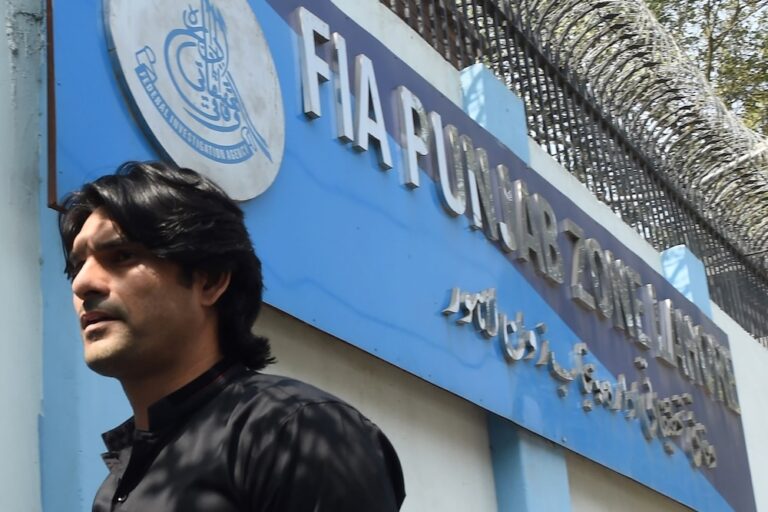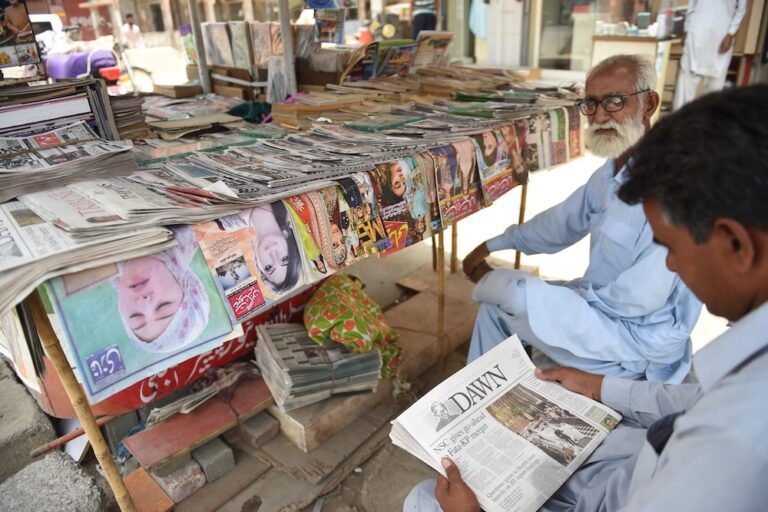A National Assembly committee has proposed amendments to a media law, under which no media outlet will be allowed to broadcast any programme "inciting violence".
(PPF/IFEX) – The National Assembly’s Standing Committee on Information and Broadcasting on October 29, 2009 proposed amendments to the Pakistan Electronic Media Regulatory Authority (PEMRA) law, under which no channel will be allowed to broadcast live footage of a suicide bomber or terrorist attack showing bodies of victims of terrorism and statements and pronouncements of extremists, militants and terrorists.
Another amendment to the law will also ensure that no anchorperson, moderator or host will publicise anything in any manner prejudicial to the ideology of Pakistan or the sovereignty or security of the state. No channel will be allowed to broadcast any programme inciting violence or hatred or any action prejudicial to the maintenance of law and order. Another amendment prohibits the broadcasting of anything which defames or ridicules the head of state, armed forces, or the executive, legislative or judicial branches of the state.
According to a press report, the Standing Committee meeting that was held in the Parliament House under the chairmanship of National Assembly member Belum Hasnain on October 29 reviewed the PEMRA (Amendment) Bill 2008 clause by clause and forwarded its recommendations to the National Assembly for final approval.
The National Assembly Standing Committee members said that some programmes shown on several private TV channels are not in conformity with the culture, traditions and ethics of the country.
The members unanimously proposed that the committee meet with the owners of the private TV channels, anchorpersons and TV personnel to make them realise the grave situation and the adverse effects on society emerging from news, current affairs programmes, dramas and advertisements.
Lawmakers belonging to the ruling Pakistan Peoples Party (PPP) and its coalition partners, the Muttahida Quami Movement (MQM), the Awami National Party (ANP) and the Jamiat Ulema-e-Islam (JUI-F), proposed the amendments, which were also backed by the two major opposition parties, the Pakistan Muslim League-Nawaz (PML-N) and the Pakistan Muslim League-Quaid (PML-Q).
In a related development, the Minister for Information and Broadcasting, Qamar Zaman Kaira, said after the meeting of the committee that his ministry was under tremendous pressure to enforce laws to stop electronic media from showing programmes which create confusion and fear among the people. He informed the committee that in order to address civil society complaints against any aspect of the broadcast media, complaints councils will be established.
“These councils will be formed in all the provinces and one will be established in the federal capital. They will consist of eminent citizens nominated by the federal government. Each council will have a chairperson and five other members, including two women,” Kaira said.
Kaira also said another committee had been formed to devise a code of conduct for the media. It consists of seven prominent journalists, law experts and other intellectuals. Justice Fakharuddin Ibrahim has been proposed to head the committee. This committee will prescribe a code of conduct for programmes and advertisements and lay down technical standards for broadcast and distribution services.


